Aug 2016
All the best to FXX's You're the Worst -- or something like that
08/30/16 03:39 PM
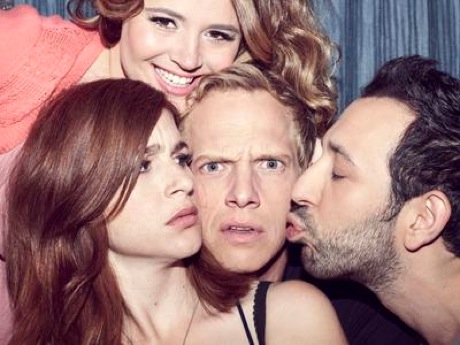
By ED BARK
@unclebarkycom on Twitter
Behind and in front of the cameras, all concerned are challenged to the hilt in Season 3’s first scene from FXX’s You’re the Worst.
Lead actors Chris Geere and Aya Cash are both butt naked in the sack after his ever-irascible Jimmy Shive-Overly more or less proclaimed his love for her clinically depressed Gretchen Cutler in last season’s final scene.
The gymnastics required to keep Wednesday night’s opening scene FXX- instead of X-rated are something of a wonder to behold. But Geere and Cash pull it off after first having pulled everything off. There should be an awards category for this.
You’re the Worst (Aug. 30th at 9 p.m. central) remains the visually and verbally bawdiest comedy series on advertiser-supported television. Commitment-phobia likewise still runs rampant as budding author Jimmy swears off any binding emotional attachments while Gretchen, a PR executive, is only slightly more willing to cave in.
“I always have one foot out the door -- with everything,” she assures Jimmy after he snorts about being “blackout drunk” on the night he threw the l-word at her.
New this season is former Orange Is the New Black co-star Samira Wiley as Gretchen’s new therapist, Justina. The character is introduced in next week’s “Fix Me, Dummy” episode, during which she takes enough verbal abuse to send Andrew Dice Clay whimpering for his mama. This half-hour also features series regular Edgar Quintero (Desmin Borges) actually saying, “The Cowboys win the Super Bowl next year.” Obviously he’s not well.
Edgar, a war veteran battling PTSD, remains hooked up with Dorothy Durwood (Collette Wolfe), whom he met last season while working with an improv comedy troupe for therapeutic reasons. But changing his meds -- and then changing them anew -- has resulted in performance problems that Jimmy dismisses as the result of same-old/same-old sex. “Your penis is clearly bored to death,” Jimmy counsels in the opening episode. But of course -- not.
The other principal characters are Gretchen’s best friend, Lindsay Jillian (Kether Donahue), whose marriage-for-the-money to wealthy sad sack Paul Jillian (Allan McLeod) had been a thoroughly lost cause until she surprisingly became pregnant. Now doughy Paul is determined to start their life anew as a “family,” but in ways that prompt Lindsay to inflict her own brand of kitchen nightmare on him at the close of the season premiere. Episode 2, the only other one sent for review, likewise ends with a sudden turn of events.
You’re the Worst, created by Stephen Falk, is intendedly cringe-worthy -- and not always to humorous effect. Gretchen’s black rapper client still repeatedly calls her a “bitch” during frequent tirades tied to her perceived shortcomings as his trio’s publicist. It’s all become one big resounding thud.
For the most part, though, You’re the Worst keeps clicking as a decidedly “adult” look at thirtysomething infantilism. Happiness pretty much remains a foreign objective in these early stages of Season 3. But there are signs that it may be improving its chances -- to at least a remote possibility.
GRADE: B+
Email comments or questions to: unclebarky@verizon.net
LeBron now taking his talents to Cleveland Hustles as the new CNBC series' principal producer
08/24/16 12:32 PM
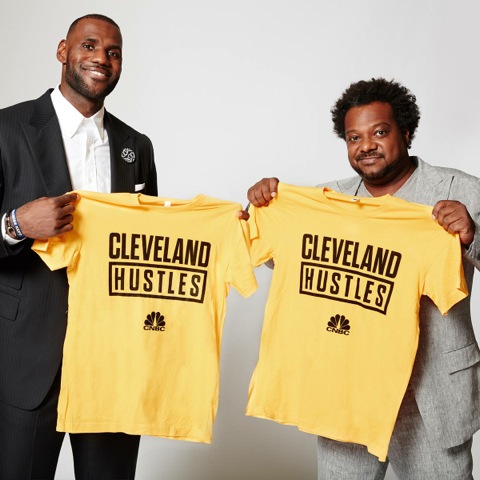
Producer LeBron James & host Bonin Bough of Cleveland Hustles. CNBC photo
Premiering: Wed., Aug. 24th at 9 p.m. (central) on CNBC
Starring: Bonin Bough, Alan Glazen, Kumar Arora, Kathy Futey, Jonathan Sawyer
Produced by: LeBron James, Maverick Carter
By ED BARK
@unclebarkycom on Twitter
Having turned Cleveland into a championship city after a 52-year drought, LeBron James now goes about the business of building up downtrodden neighborhoods.
The pariah turned patriarch is the co-executive producer (along with longtime pal Maverick Carter) of CNBC’s Cleveland Hustles, an eight-episode series that hooks up budding entrepreneurs with savvy investors.
Yes, it’s basically Shark Tank without as many egos or rejections. But Cleveland Hustles also manages to distinguish itself in the opening episode as a well-meaning, solidly executed, feel-good effort underscored by James’ go-to slogan: “Nothing is given. Everything is earned.”
Other than explaining the show’s mission statement in an opening on-camera cameo, he has nothing to do with how the first face-off pans out. Chareen Fountain, a bubbly hair salon owner, vies with bagel makers Geoff Hardman and Dan Herbst for a $100,000 investment from moneyman Alan Glazen.
The show has targeted Cleveland’s struggling Gordon Square Arts District as its ground zero for new small businesses. Can Fountain’s newly named Torch Lofts meet Glazen’s financial goals during the course of a 48-hour “pop-up” launch? Or will the Cleveland Bagel Co. end up getting his dough?
Cleveland Hustles’ other featured investors -- Jonathan Sawyer, Kathy Futey and Kumar Arora -- will dangle their money before new pairs of competitors in future one-hour episodes. The host is congenial Bonin Bough, who helps to stir up a little “drama” without being a jerk about it.
“LeBron James, the No. 1 basketball player in the world, still has a coach,” he gently admonishes the bagel guys after they initially balk at opening during breakfast hours. (Going unsaid is that James was instrumental in having the Cleveland Cavaliers change coaches in the middle of last season -- from David Blatt to Tyronn Lue.)
Above all, though, this is a benign presentation compared to the likes of Shark Tank or any of Gordon Ramsay’s cutthroat kitchen competitions, with the exception of the kid-powered Masterchef Junior. At the end of the premiere episode, investor Glazen predictably is torn between his two choices. But throughout, he never breathes fire.
In future weeks, Cleveland Hustles will chart the eventual four winning entrepreneurs’ successes or failures in opening permanent businesses in the Gordon Square neighborhood. So far, so good, with the show making a winning first impression while James mostly stays out of its spotlight.
GRADE: B
Email comments or questions to: unclebarky@verizon.net
Imported Gomorrah offers stark, dark mob activities
08/23/16 02:37 PM
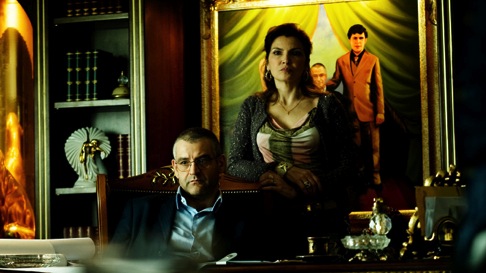
Premiering: Wednesday, Aug. 24th at 9 p.m. (central) on Sundance TV
Starring: Fortunato Cerlino, Maria Pia Calzone, Salvatore Esposito, Marco D’Amore, Marco Palvetti, Elena Starace and many more
Produced by: Giovanni Bianconi, Stefano Bises, Leonardo Fasoli, Ludovica Rampoldi, Roberto Saviano
By ED BARK
@unclebarkycom on Twitter
Life can be short, for the population at large and most definitely in the gangland, Naples-set Gomorrah.
Dark in tone and oftentimes even more darkly lit, Season One’s 12 episodes begin unreeling Wednesday, Aug. 24th on Sundance TV. TV critics were given access to all of them, but I only hung in for the first three. Mainly because life indeed is too short, in my view at least, for a full investment in a drama that accentuates mob violence but lacks the “charm,” humor and overall empathy generated by The Sopranos.
Reasonable facsimiles of Pauly Walnuts, Silvio Dante or Salvatore “Big Pussy” Bonpensiero would be most welcome. Instead, the battle-hardened denizens of Gomorroah methodically go about their amoral business while generating next to no rooting interest in their survivals. Machine gun the whole lot of ‘em and be done with it.
Still, Gomorrah has emerged as “Italy’s most popular television series of all time,” according to Sundance TV publicity materials. And the network already has acquired Season 2 as well, with the Italian intact and English language subtitles deployed.
Drawn from the same-named novel by Roberto Saviano, Gomorrah first was a 2008 feature film that won the Grand Prix at that year’s Cannes Film Festival. One of its central characters, Roberto, even worked in “waste management.”
The series version is populated by different characters, with Don Pietro Savastano (Fortunato Cerlino) the godfather in residence. His principal foe is Salvatore Conte (Marco Palvetti), a man who can’t seem to make up his mind about the suitability of a new living room couch. Both men want to control a billion dollar cocaine trade that’s regularly referenced in TV news accounts. There’s a lot of automatic weapons fire to underscore this, with one hit deserving another -- and so on.
Don Pietro would like his impulsive son “Genny” (Salvatore Esposito) to succeed him. But the chubby kid is too much of a playboy and first must be instructed in the art of cold-blooded killing by the trusted Ciro Di Marzio (Marco D’Amore). Don Pietro’s wife, “Imma” (Maria Pia Calzone), also has designs on the top job.
By the end of Episode 3, one key character is still incarcerated in a prison with incredibly lax security while another makes a rather amazingly quick recovery from a self-inflicted motor vehicle accident. F-bombs regularly intercede in the review screeners, but surely won’t make the cut on an advertiser-supported cable network. There also are brief flashes of nudity.
Hard-core devotees of mob activities might well find something to like in the all-business approach of Gomorrah. But for me, the “entertainment” value is next to nil in times when real-life, mass mayhem is all too plentiful. The Sopranos had a relatable cavalcade of characters whose foibles and fractured syntax were leavening agents. Bada bing, bada boom. Gomorrah perhaps is a more realistic depiction of the mob mentality. But I wouldn’t want to break bread with any of these guys. Nor do I care what happens to them.
GRADE: B-minus
Email comments or questions to: unclebarky@verizon.net
Hammy and ham-handed: NBC's geezer-centric Better Late Than Never
08/18/16 01:04 PM
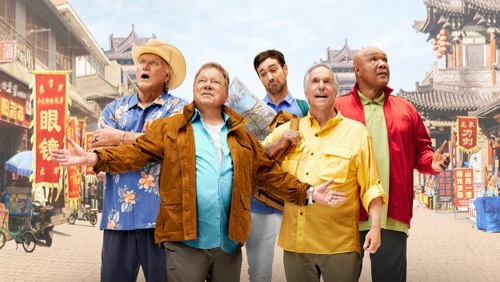
Premiering: Tuesday, Aug. 23rd at 9 p.m. (central) on NBC
Starring: Henry Winkler, William Shatner, George Foreman, Terry Bradshaw, Jeff Dye
Produced by: Henry Winkler, Jason Ehrlich, Tim Crescenti, Craig Zadan, Neil Meron, Carol Leifer, Stephanie Chambers, Alex Katz
By ED BARK
@unclebarkycom on Twitter
“All the world’s a stage,” a dude named William Shakespeare famously wrote.
But The Bard surely wouldn’t have envisioned or countenanced NBC’s depositing of Henry Winkler, William Shatner, George Foreman and Terry Bradshaw in Tokyo for “an adventure for all ages.” Or as Shatner asks in the premiere episode, “How do you say Ugly American?”
He’s referring to Bradshaw, who of course is the quartet’s designated yahoo in NBC’s unfortunate Better Late Than Never. Not that his three fellow senior citizen companions are much more rarefied in this clumsily edited romp and stomp through Japan’s most populated metropolis, where 24 million chopsticks are used annually, according to the show’s recurring printed tidbits.
Premiering on the heels of NBC’s Rio Olympics telecasts, the four-episode series is adapted from South Korea’s Grandpas Over Flowers, which so far has lasted four seasons. Shatner is the quartet’s senior member at age 85, followed by Winkler (70), Foreman (67) and Bradshaw (also 67). That would make this the oldest-skewing series in NBC history had the network not added Last Comic Standing finalist Jeff Dye, 33, as “The Sidekick.”
In the show’s early minutes, viewers are supposed to believe that Winkler spontaneously cold-called Shatner, Foreman and Bradshaw all at once to propose a trip to Asia. He then adds Dye. And within seconds the quintet is all aboard a plane to an exotic land where there are “more pets than children.”
On paper this seemed as though it could be a bit of fun. In execution, it’s labored and way over-cooked -- even when the guys learn they’ve just had pork and chicken vaginas on skewers after Bradshaw asks if he can have fries with whatever awaits them. Foreman brings along his barbecue sauce.
First, though, they all check into The Capsule Hotel, where the “rooms” are mattresses in very small compartments. “It looks like a kennel,” Shatner cracks.
Viewers are supposed to believe they spent several nights at this place while going to bed fully dressed. Far more likely they spent a few hours filming some gag footage before checking into off-camera accommodations in a luxury hotel. While at The Capsule, a nude Japanese man keeps walking to and from his compartment. This prompts another Shatner aside: “Funny, I didn’t know he was Jewish.” He does, however, get off an amusing Price Line rejoinder after Winkler feeds him a line.
The boys also visit Tokyo’s Pon! TV show, during which Bradshaw observes, “These people are nuts over here.” Other activities include a more traditional meal at an expensive restaurant and a huff-puff climb to a spot where they can get a picturesque view of Mount Fuji.
Talk-to-the-camera moments are frequent and no doubt in large part scripted. As is a fuzzy wuzzy ending that seems about as authentic as Shatner’s still fulsome head of hair.
Unless there’s an unexpected appetite for more of this, Better Late Than Never will have run its course by the time the new fall season gets underway in earnest on NBC and rival broadcast networks. So this likely will be a mere Drop in the Bucket List -- which come to think of it might have made for a better title.
GRADE: C-minus
Email comments or questions to: unclebarky@verizon.net
Rather than wait, an audacious Netflix throws The Get Down at the Olympics
08/10/16 03:23 PM
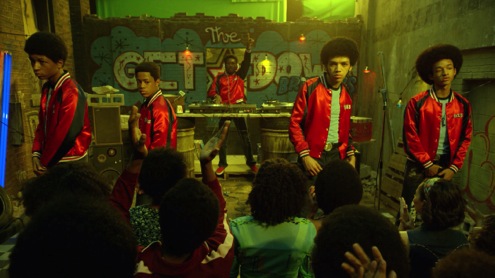
Premiering: The six-episode Part One begins streaming Friday, Aug. 12th on Netflix
Starring: Justice Smith, Herizen Guardiola, Shamelik Moore, Jimmy Smits, Jaden Smith, Skylan Brooks, T.J. Brown, Mamoudou Athie, Giancarlo Esposito, Lillias White, Yahya Abdul-Mateen II, Zabryna Guevara, Yolanda Ross, Kevin Corrigan, Eric Bogosian
Produced by: Baz Luhrmann, Shawn Ryan, Catherine Martin, Stephen Adly Guirgis
By ED BARK
@unclebarkycom on Twitter
The Summer Olympics are still building and drawing big audiences for NBC. So there’s been a respite from significant new program premieres -- unless you’re the entity that never sleeps.
On the heels of two acclaimed originals -- Stranger Things and The Little Prince -- Netflix goes aggressively against the grain of conventional wisdom by launching its most expensive and extensive effort to date on Friday, Aug. 12th. That’s when the first six episodes of The Get Down, which constitute Part One, begin streaming in all their vibrant colors and throbbing craziness.
Created by Australian film auteur Baz Luhrmann (Moulin Rouge, Strictly Ballroom, Australia and the 2013 version of The Great Gatsby), it’s a $120 million look at the formative years of disco, hip-hop and most emphatically, rap. The setting is 1977 New York City and more specifically the badly decaying and turbulent South Bronx. But five of the six episodes begin in 1996, with a rap summation of previous events. It’s all unlike anything ever made for television, even if there are obvious splashes of West Side Story, Glee and even That ‘70s Show with its goofy, communal pot-smoking scenes.
Unfortunately, The Get Down can also be a beat down at times, beginning with an overcooked and run-in-place 90-minute episode in which Luhrmann appears to be channeling the endless wedding reception scene from the late Michael Cimino’s The Deer Hunter. A Gomorrah-like nightclub called Les Inferno is the setting here, with cackling boss lady “Fat Annie” (Lillias White) over-eating the scenery as well. The episode captures this garish scene at undue length before lethal automatic weapons fire at last intervenes to upstage the pulsating disco beat.
There’s a lot else going on from many different directions. But at the heart of The Get Down are Ezekiel “Books” Figuero (Justice Smith) and Mylene Cruz (Herizen Guardiola), both of whom are immensely musically talented in their own very different ways.
“You sing like red velvet feel,” the poetic Zeke tells her, desperately longing for Mylene to be his girl. But her father is super-stern pastor Ramon Cruz (played by Giancarlo Esposito of drug kingpin Gus Fring fame on Breaking Bad). Spotting his daughter in a low-cut dress, he upbraids her as a “teenage whore” sneaking out to sing “disco garbage” rather than sticking to pious church hymns. It then gets worse for her.
Jimmy Smits is the other notably familiar face over these six episodes made available for review. Encased in an array of eyesore leisure suits, he’s Francisco “Papa Fuerte” Cruz, a South Bronx powerbroker who also happens to be Ramon’s brother. It takes a while for Smits to make this character click a bit and emerge as more than a cartoon.
There’s also Shaolin Fantastic (Shamelik Moore), a thrill-seeking, acrobatic loner and protege of the quietly imperial Grandmaster Flash (Mamoudou Athie), who calls his pupil “Grasshopper” in the mode of the Kung Fu TV series of the early-to-mid ‘70s. Zeke and his three principal buddies, Dizzee, Boo-Boo and Ra-Ra (Jaden Smith, T.J. Brown, Skylan Brooks), revere Shaolin and hope to somehow bask in his presence. But they get far more than that in due time.
The elongated Episode 1 also features a laughably indestructible demo record made by Mylene, who yearns to be a singing star. The record somehow survives a drop from a multi-story building and a few Frisbee-like tosses into hard concrete.
The Get Down is intercut with grainy, real-life footage from the ‘70s and pulsating hits from those times as well as some bracing original music. F-bombs and the n-word are dropped with regularity, as are slurs aimed at the gays who drive a thriving disco scene. It’s said that they can make or break a would-be hit by how frenetically they respond to it on the dance floor.
But Zeke’s raps also grow in stature and import. The Get Down’s core is the birth of this genre and what it represents to the trapped denizens of dead end neighborhoods.
The 25-hour New York City blackout in July, 1977 also serves as a subplot. Looters have a field day, with the real-life David Brinkley lamenting the city’s “wild outburst of crime.”
The Get Down likewise is demonstrably untamed, excelling at times and faltering at others while trying to get away with lines like, “A good steak’s like a prize fight. It ain’t good unless it’s bloody.” That one comes from Fat Annie, whose lair snares younger men, including Shaolin, in search of quick and easy money.
Down the stretch of Part One, a washed-up, drugged-out former big-time record producer named Jackie Moreno (Kevin Corrigan) almost steals the whole show with his pathetic attempts to write a hit song suitable for the soaring voice of Mylene Cruz. But somehow, some way . . . well, you’ll see if you hang in there long enough to begin appreciating The Get Down for its sheer, unbridled audacity.
Production problems and creative challenges plagued The Get Down, with Luhrmann admittedly on the verge of giving up at several points. But he powered through and has birthed a grossly uneven but still oft-scintillating mess-terpiece.
Music-driven series have been plentiful in recent years, with NBC’s Smash and HBO’s Vinyl both falling apart while Fox’s Glee, Starz’s Power and Fox’s Empire have become hits for their respective networks.
What happens with The Get Down is very much an open question. It may prove to be too expensive and daunting to last beyond the 12 episodes initially ordered by Netflix. But Part One’s climactic Episode 6 easily is the strongest of the initial batch, with its opening trio of separate but overlapping scenes seamlessly tied to an overall theme of elemental power-wielding. As orchestrations go, The Get Down perhaps has finally found its groove -- and might even stay in it.
GRADE: B
Email comments or questions to: unclebarky@verizon.net
Netflix's The Little Prince never stops short of wondrous
08/04/16 10:55 AM
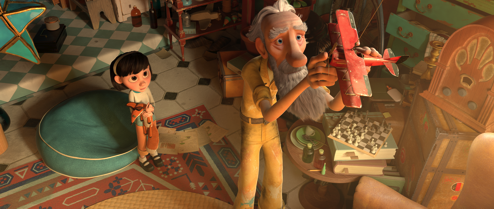
Mackenzie Foy, Jeff Bridges voice the principals in The Little Prince. Neftlix photo
By ED BARK
@unclebarkycom on Twitter
Its ratings remain a closely guarded, unsolved mystery. And where all its money comes from is still anyone’s guess.
In the end, though, it’s the product that shines through. And Netflix has another beauty in The Little Prince, which begins streaming on Friday, Aug. 5th.
Originally scheduled for a March release in theaters, this adaptation of Antoine de Saint-Exupery’s 1943 fantasy finds a home just in time to provide what the world needs now -- an inspiring, life-affirming diversion that has never grown old or sappy.
Beautifully and expressively animated, The Little Prince basically is the story of an old man who still acts like a kid and a kid who’s being programmed to be an “essential” cog in the grand industrial, soul-deadening scheme of things.
Jeff Bridges and Mackenzie Foy respectively and endearingly voice “The Aviator” and “The Little Girl” while the title character is brought to life by director Mark Osborne’s son, Riley. Explaining things much further is both a “spoiler” and a daunting endeavor. But The Little Prince most certainly does make sense as a deeper and more stimulating relative of Peter Pan. No one vows to never grow up. But what sort of grownup will you be?
The Little Girl’s single mom (Rachel McAdams) is determined to get her daughter into Werth Academie, where the answer to “What will you be when you grow up?” is “Essential.” Rejection sends the two of them to a square-blocked home that resembles almost all of the other neighborhood abodes. But this one’s an affordable bargain, given its location right next to an eclectic and misshapen structure inhabited by Bridges’ aging dreamer. It’s a veritable Neverland both inside and out, but without anything creepy going on.
While mom’s away at work, her daughter is assigned daily, timed tasks in the structured Werth mode. But the wonder kicks in when she ventures next door and becomes entranced by the old man’s tale about first meeting the Little Prince as a young man after his plane crashed in the Sahara desert.
The Little Prince is well-populated with familiar stars voicing supporting characters during a spinning tale of single-denizen planets and a hard-knocks real world. Among them are Ricky Gervais (“The Conceited Man”); Marion Cotillard (“The Rose”); James Franco (“The Fox); Paul Giamatti (“The Academy Teacher”); Benicio Del Toro (“The Snake”); and Albert Brooks (“The Businessman”).
It all comes together in G-rated fashion suitable for viewers of all ages. There are no fart jokes or sexual double entendres. But as the story blooms and grows, there’s enough action to keep young males and maybe even teenagers on board. “Look with your heart” is the overriding message.
Netflix, which recently scored with the sci-fi drama Stranger Things, has chosen a programming course that’s anything but predictable. It goofs around with Fuller House; sets the “social media” world abuzz with a daring continuation of Arrested Development; heaps on the political skullduggery with House of Cards; goes comedic and tragic with Orange is the New Black; makes headlines with the true-crime documentary series Making a Murderer; and now rescues The Little Prince from the hands of Paramount’s what-were-they-thinking brain trust after the studio dropped it.
Dare it be said that Netflix has become an indispensable part of the viewing universe? We’re definitely nearing that point.
GRADE: A
Email comments or questions to: unclebarky@verizon.net
The "worst TV candidates since Richard Nixon" do not include Hillary Clinton
08/02/16 11:37 AM
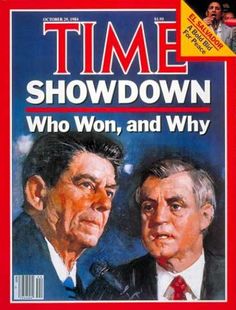
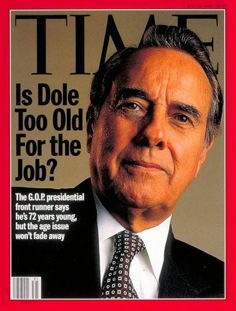
By ED BARK
@unclebarkycom on Twitter
TV critic David Zurawik, who’s been a frequent and oft-hyperkinetic presence on CNN’s Reliable Sources, Fox News Channel’s Media Buzz and lately, Reliable Sources again, is of the opinion that Hillary Clinton is “the worst TV candidate since Richard Nixon.”
He wrote this on July 29th for The Baltimore Sun. And a printed subhead on the July 31st edition of Reliable Sources repeated this declaration even though the subject never came up during his byplay with host Brian Stelter.
Decades ago, Zurawik and I were competitors when he wrote about television for the now long defunct Dallas Times-Herald. We regularly clashed during those times but since have patched things up. On this particular subject, though -- and with all due respect -- the fact of the matter is that Zurawik is dead wrong. Sorry, couldn’t resist the standard issue politician-speak.
I’ve been covering television’s coverage of presidential campaigns since 1980. And at least three party nominees -- Walter Mondale, Bob Dole and Michael Dukakis -- were consistently pretty terrible on television and far inferior to Hillary Clinton. Another trio -- Al Gore, John Kerry and Ross Perot -- likewise had a rough time selling themselves on the tube. Even Dole, years after being routed by Bill Clinton in the 1996 presidential election, once told David Letterman, ”If Al Gore gave a fireside chat, the fire would go out.”
Smiling Bill Clinton was a master at getting his TV messages across while Dole tended to snarl and glower before his no-nonsense old-school persona later made him something of a hit as both a Comedy Central “correspondent” and late night talk show guest.
But Mondale admittedly just couldn’t cut it on TV at all. Worse yet for him, he was up against the master of the modern electronic age -- Ronald Reagan. The Gipper majestically used pictures crafted by his head image-maker, Michael Deaver. I recall one moment in the campaign where Mondale sweated through his shirt during a speech in a barn while Reagan used Normandy as a backdrop while commemorating the 40th anniversary of D-Day. ABC’s Sam Donaldson duly noted the disparity during his campaign report on World News Tonight.
Immediately after his landslide loss to the telegenic Reagan, Mondale spoke of his awkwardness in the presence of cameras. “Modern politics requires television,” he said. “I think you know I’ve never really warmed up to television, and in fairness to television, it’s never really warmed up to me.”
During an interview at the 1996 Republican National Convention, Mondale’s daughter, Eleanor (then an entertainment reporter for the E! channel’s E! News Daily), told me that both her father and Dole have never fully adjusted to the television age.
“My father likes being in office,” she says. “He doesn’t necessarily like the campaigning part of it because of having to be conscious of the television cameras. The media were a source of discomfort for him, and it seems that Dole is from the same school my Dad was. When they grew up, America was different.”
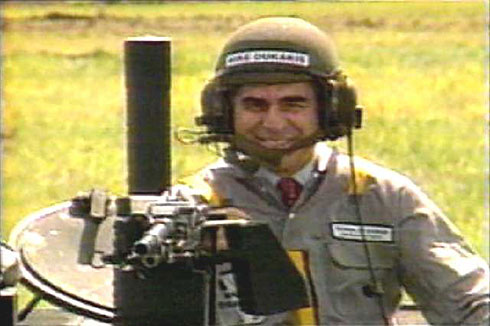
In the subsequent 1988 presidential campaign, Democratic nominee Michael Dukakis wasn’t exactly up against a TV wunderkind in George H. W. Bush.
But Dukakis’ television acumen was no better than Mondale’s. His much-ridiculed ride in a tank, complete with helmet and silly grin, were a gift that kept on giving to the Republicans. And in the week before the election, Dukakis appeared on Nightline for an exceedingly dull and mechanical 90-minute interview with anchor Ted Koppel. He repeated the same rote answers while Koppel grew exasperated and at one point told him, “I think you still don’t get it.” He didn’t. And the elder Bush, who had declined Nightline’s offer of equal time, had to do nothing more than chortle with his aides at the lifeless form they beheld.
Gore and Kerry also squared off against a Bush -- George W. Neither could muster much of a TV persona, particularly in comparison to Bill Clinton, the Democratic Party’s preceding two-term President. Clinton even withstood the Monica Lewinsky affair, and is still perceived by most as a TV natural. Yes, he tends to go on way too long. But the onetime junk food-imbibing Big Galoot clearly took both George H.W. Bush and Dole to the TV wood shed -- time and time again.
In comparison, Hillary Clinton is no TV dynamo. “Her failings on the small screen are directly connected to the core problem of her presidential bid: a widespread perception that she is dishonest,” Zurawik writes.
But that perception has nothing to do with her TV prowess. Hillary may basically despise the media, as is evidenced by her extreme reluctance to hold formal press conferences. But she’s personable enough as a television “performer,” with a big laugh that actually seems rather genuine for the most part.
Trump on the other hand is mostly a master of -- Twitter. He’s not, as Zurawik writes, “one of the most adroit TV candidates in the history of the medium.”
President Obama, who detests Trump and vice-versa, is far better at projecting a winning, grinning TV persona. What Trump has been good at is gobbling up all the “free media” lavished on him during the primary and now the general election campaigns. CNN, Fox News Channel and MSNBC in particular can’t get enough of him. Lately, not because he’s such a great TV communicator, but because he’s likely to say just about anything during the course of digging another hole for himself. Trump’s stump speeches and frequent press conferences remain rambling and repetitive, but there’s always a better than 50 percent chance that he’ll go off the rails at some point. That’s hardly a mastery of television. But I guess it’s “good television” in terms of not fully knowing what Trump might do to himself.
I’d compare Trump to Ross Perot in many respects. He’s a prickly billionaire with an extremely thin skin who constantly berates the media as know-nothings while craving their attention 24/7. But Perot met his match -- in Al Gore of all people -- during the heavily-watched 1993 NAFTA debate on CNN’s Larry King Live. The Vice President was widely perceived to have cleaned his clock, although of course Perot would never admit as much. Neither billionaire is capable of an unfettered apology. There’s always someone else to blame. In Trump’s case, virtually everything is “rigged.” Lately he’s added the general election itself to his list of grand conspiracies.
With the first one-on-one presidential debate coming on Sept. 26th -- unless the carping Trump backs out -- one wonders whether he’ll meet the same fate as Perot (but at the hands of the wonky Hillary Clinton). Can his bluster overcome her far firmer command of facts and issues? Hillary has many vulnerabilities, and Trump will very likely try to bulldoze her if he can. But this won’t be the same as Reagan going against Mondale and winning with a charm offensive and witty rejoinders after “losing” their first debate. Hillary may not have all that much innate charm, but compared to Trump, she’s Betty White.
So no, Hillary Clinton is by no means the “worst TV candidate since Richard Nixon.” Not even close. Mondale, Dukakis and Dole are clearly her superiors in this realm while Gore, Kerry and Perot are no better than her equals.
As for Donald Trump, well, he’s no Ronald Reagan. Or Bill Clinton. Or Barack Obama. But in the end, he may be right up there with Joe McCarthy.
Email comments or questions to: unclebarky@verizon.net
